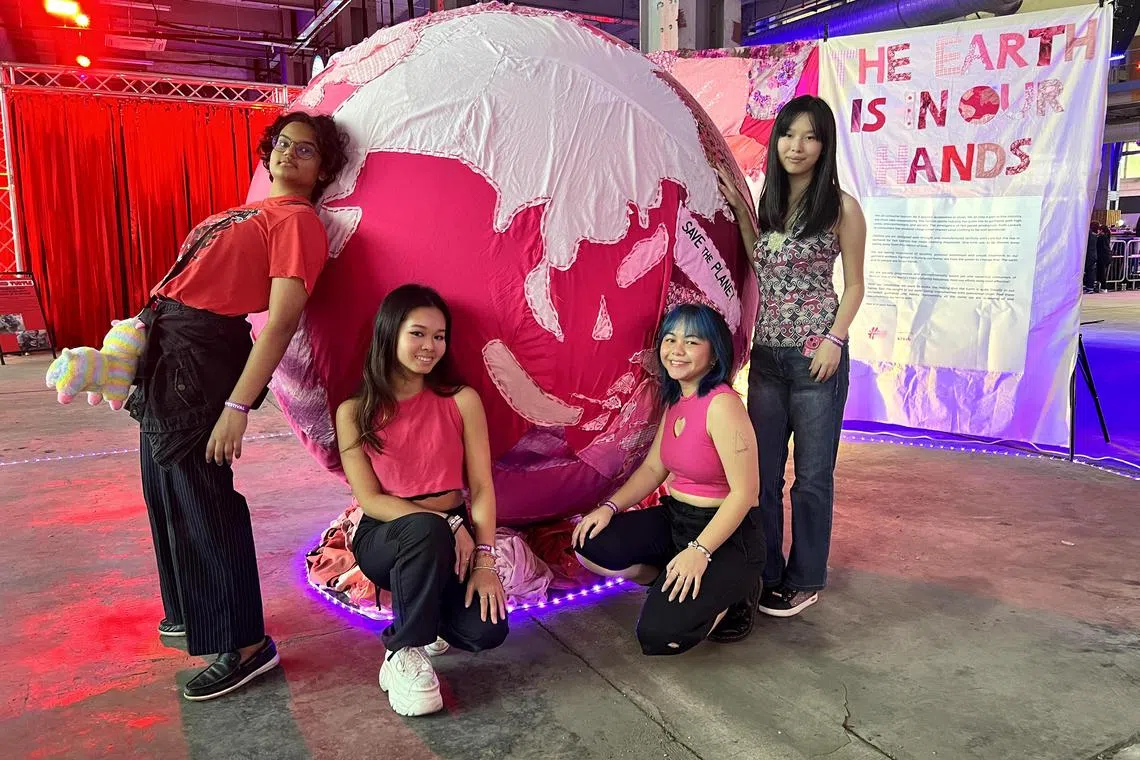From aspiring fashion designer to sustainable fashion advocate
The TL;DR: Lumin Hew was 15 when a documentary opened her eyes to the environmental impacts of the fashion industry. Today, she is the founder of youth sustainability collective Fashion Parade, which educates young people about sustainable fashion.
Sign up now: Get ST's newsletters delivered to your inbox

Ms Lumin Hew (second from the left) founded Fashion Parade in 2021 to find more like-minded youths passionate about sustainable fashion.
PHOTO: FASHION PARADE
Follow topic:
SINGAPORE – For as long as she can remember, Ms Lumin Hew had wanted to be a fashion designer. By the age of 11, she had learnt to sew, in order to make and repair her own clothes.
However, a documentary she watched for a school project when she was 15 changed her mind about working for big fashion brands. The documentary, River Blue by conservationist Mark Angelo, highlighted how the manufacturing process of the fashion industry polluted the earth’s rivers.
She recalled: “It was a very visual documentary. I could no longer turn a blind eye to (the industry’s) negative externalities any more.”
Now 23, Ms Hew is the founder of Fashion Parade, a youth organisation that focuses on raising awareness of sustainable fashion, which she runs full-time.
The organisation conducts workshops, events and learning journeys to The Circular Fashion Hub, a space in Jalan Besar that hosts a variety of sustainable fashion organisations such as second-hand stores and clothes swapping platforms, to teach people about the fashion supply chain and sustainability in fashion. Some of these sessions are free and others are ticketed.
Ms Hew said that she founded the organisation in 2021 not just to champion a cause important to her, but also to find community.

A mending and sewing workshop organised by Fashion Parade.
PHOTO: FASHION PARADE
“Growing up, I found that it was difficult to find people who were as passionate (about sustainable fashion) as I was,” she said.
“Fashion Parade was a way for me to meet more like-minded people who shared the same vision.”
Fashion Parade organises monthly upcycling workshops, teaching participants how to mend or transform existing clothing items to prevent waste.
“These workshops also raise awareness about labour issues in the fashion industry,” she said. “I think many people are shocked about how little money (workers in developed countries) earn.”
In 2024, it was reported that Bangladeshi garment factory workers earned as little as 8,300 taka ( S$92 ) per month

Fashion Parade organises monthly upcycling workshops, teaching participants how to mend or transform existing clothing items to prevent waste.
PHOTO: FASHION PARADE
Ms Hew said that she tries to be sustainable by swopping clothes instead of throwing them out, creating wishlists to avoid impulse shopping and sewing and mending her clothes. Still, she understands that fast fashion may be the only option for some people because of its affordability and accessibility.
“It’s about intentionality. The problem isn’t buying (fast fashion) out of necessity, it’s overconsumption,” she added.
When asked about the advice she has for other youths looking to be sustainable, she said: “Stay curious and stay informed. A little effort can go a long way.”

